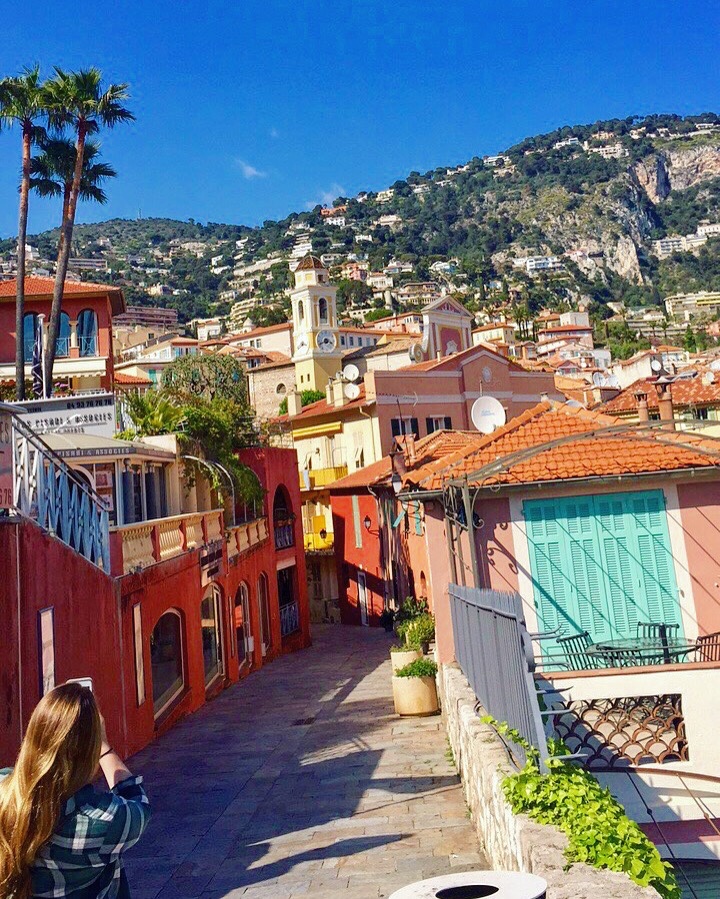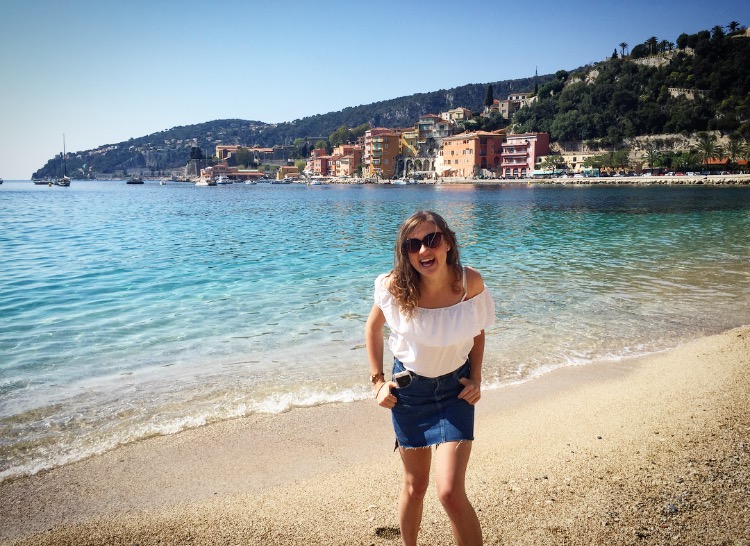Charlotte Daniels decided to do just this, and absolutely loved the experience. Here she shares her incredible experience and tips to help you maximise your trip if you are planning something similar.
1. There’s so much more to France than just Paris
Whenever most people think of a year abroad in France they dream of the sophisticated Parisian lifestyle, drinking coffee at the finest establishments along the Champs Elysees, walking along the Seine with the Eiffel tower glistening in the background.
However, I learnt to discover the real ‘joie de vivre’ living in the beautiful south of France for my year abroad. I grew to realise how vast and beautiful the country is.
From visits to the Pyrenees in freezing temperatures, to exploring the cobbled streets of the medieval Cité of Carcassonne, to a summer voyage along the Côte d’Azur, I realised how much the country has to offer.
I fell in love in particular with the south of France, with rows upon rows of vineyards bathed in sunshine and the quaint little villages with their windy streets and unique charm. I would definitely recommend voyaging further afield and particularly point to the luscious relaxed surroundings of the French southern countryside.
2. French hospitality is something else

The French are often mischaracterized as unfriendly and hostile towards foreigners, but in fact I found the complete opposite to be true.
Everyone I met on my year abroad made me feel very welcome and I would even say that the culture and French way of life lends itself to a warm and friendly nature.
From the mandatory ‘bises’ (kisses) on the cheek each day even with total strangers to the warm and welcoming sense of community I experienced, I would consider the French hugely hospitable and friendly.
Teachers used to invite me to dine at their houses, the family I tutored for were only too pleased to cook for me, show me their region and even lent me their private mansion for when my friends came to visit – I couldn’t believe it!
Clearly though, on this point, I have to mention the importance of being wary when travelling abroad and researching on sites such as the FCO on issues such as being hustled before you travel. You can’t trust everyone!
But nevertheless, in my experience French hospitality was second to none and people often went out of their way to ensure I felt at home in their beautiful country.
3. My knowledge of English is not as great as I thought
As a languages student myself, I like to think I’m fairly knowledgeable on the topics such as grammar and sentence construction.
However, one thing that was highlighted during my time teaching English was actually how little we ourselves know as native speakers about the basic construction of our own language. I found myself questioning how to use the conditional perfect in English for example, or whether we do in fact use the pluperfect in hypothetical expressions?!
It struck me that the basics of grammar are not specifically taught in our own native language and that I, in fact, have a better grasp of verb construction in French and Spanish than I do in my own language!
Luckily the classes weren’t too complex and a lot of the students were simply interested in learning the swear words (!) but nevertheless I would definitely say my English has improved as I had to do my ‘homework’ too, in preparation for lessons.
4. Textbook French really isn’t that useful
Comment allez-vous? Comme ci comme ça!
Such phrases that our French teachers used to profess would help us when going abroad to France are, generally speaking, not used in daily French.
I learnt that spoken French is hugely different from the eloquent elaborate French subjunctive-filled texts we used to write at university. I learnt an adequate response to almost any statement was ‘ça va’ or ‘c’est pas grave’ (it’s not serious!) and that colloquial
French is filled with phrases and words only properly learnt when living in the country! Having the ‘savoir faire’ to pass as a native was certainly a year-long challenge.
5. Food (re: cheese and wine) is very important!
The highlight of my week when living and working in France was definitely the weekly ritual of the food market.
Every Saturday the picturesque square in the heart of Carcassonne would be filled with vegetable growers and farmers from all over the region selling the freshest produce at the most reasonable prices.
Food and wine for the French is definitely at the heart of their culture. Meal times would last at minimum an hour or two and the French would take such pride over perfecting their culinary delights: from the finest crème brulées to the melted oozing camembert starters.
I attended many fête du vins (wine festivals), food markets, cheese markets, wine-tasting sessions and Christmas markets filled with innumerable delights. French cuisine is undoubtedly ‘la crème de la crème’.
6. French bureaucracy is a nightmare
I suppose it’s only just that I mention the, albeit very minute, negative side of my experience teaching in the south of France.
The main thing that springs to mind is that very real challenge that every year abroad student faces: French bureaucracy.
Whilst, admittedly, the laid-back French way of life did have its benefits when I was sat relaxed with a glass of wine in hand for my two-hour lunch break, this distinct lack of urgency also meant a lot of delays in getting things organised in terms of official documents.
For example, applying for help with funding for my accommodation with the CAF (Caisse d’Allocations Familiales) took almost the entire year to be fully approved and organised before I received any money.
Friends of mine have also said that organisation at the universities was certainly not a forté, and it’s just a case of persistence to try to organise your rights as a foreign citizen to ensure you get thing sorted such as health insurance etc.
But there is lots of assistance with this online from the Foreign and Commonwealth Office. We also found advice pages such as advice on National Insurance for British Citizens really helpful when sorting this.
7. Everyone is very keen to learn English, and on the whole they love the English!
Being an English language assistant another thing that definitely struck me was how much everyone seemed to be fascinated with and adore the English.
I can honestly say I felt welcomed and supported by everyone I encountered on my year abroad. Most people were so keen to learn about the country (mainly London and the royal family) and practise their language with me.
Being placed in quite a rural part of the south of France was ideal as there weren’t many native English speakers around. Therefore, I was almost viewed as some kind of foreign idol!
There’s something about being a language assistant that automatically gains you admiration among students too. I’ve never felt so important!
8. Travelling around the country does not need to be costly

A language assistantship is a fantastic way to see the world. 12 hours a week of work is not taxing at all so myself and the other languages assistants from all over the globe definitely made the most of weekends and holidays by travelling around Europe.
Trips included: Monaco, Montpellier, Toulouse, Paris, Madrid, Barcelona, Bordeaux, Marseilles, San Sebastian, Brussels, Amsterdam, Florence, Venice, Nice, the French Riviera to name but a few!
But, as students ourselves, how did we afford these travels? I came to realise that travelling on the cheap was indeed possible especially with guides to visiting place like the French Riviera on a budget.
With discounts available such as the SNCF (French rail company) student card ‘carte jeune’ which gave us 25% off all our train journey around the country, cheap bus companies such as Flixbus taking us from Carcassonne to Marseille and, of course, budget airlines flying us quickly across Europe, we managed to travel extensively without breaking the bank.
Once we’d done our research we soon became ‘travel aware’ savvy travellers and learnt there are so many ways to travel and explore on the cheap but also safely.
Sites such as Airbnb, blabla car, free walking tours, hostelworld.com all offer cheap ways to travel and accommodation at reasonable prices.
Eating like a local and sourcing out the local markets can be a great way to save money too and we managed to travel far and wide exploring the beautiful country and all it’s culture without spending extortionate amounts.
Before any voyage, it’s important to check out the FCO foreign travel advice of your destination which can provide you with essential advice and also potentially save you money by being aware of local customs and restrictions. This is something we found to be very helpful.
9. Teaching is a really rewarding career

Since my year abroad I have fully committed to a career in teaching, and been accepted onto a graduate scheme to teach French and Spanish.
Before the placement, I was undecided about my future career plans following university, but I realised that watching my students progress throughout the year was something that filled me with immense pride.
Teaching really is a rewarding career and the assistantship was a great taster for this. I watched my students mature and learn.
Despite not being that much older than them myself, I felt real joy as I watched them progress from a simple ‘Hello, my name is…’ to a far more complex ‘When I’m older, I will be a rap star’!
I was ever so emotional when it was time to leave – in fact asked the head if I could stay on for another few months.
10. The year abroad and the pursuit of the ideal life: an ever-changing concept

At every turn and every new place visited I was left with the thought: ‘I love it here. I could definitely see myself living here’.
The world is definitely bigger than I realised and my travels around France and the rest of Europe have definitely opened my eyes to the rewards and excitement of adventure and travel. Before considering moving ‘Outremer’ it was really essential for me to research useful Living Abroad Guidelines and checklists.
Living abroad was a hugely enlightening experience and I was fortunate enough to visit so many idyllic places, all of which changed my mind of where I could see myself living in the future. But is the grass always greener?
Upon returning to the UK after a year of calling France my home, I realised that home comforts and those rainy morning commutes do have a fond place in my heart.
The pursuit of the ideal life is something every year abroad student embarks upon. But no matter how many stunning Instagram-worthy sunsets I captured, how many exquisite wines I tasted from authentic vineyards, or how many beautiful quaint villages I had the pleasure of visiting, the wonders of travel also highlighted to me that ‘la vie est belle’ back at home with loved ones too.
By Charlotte Daniels









